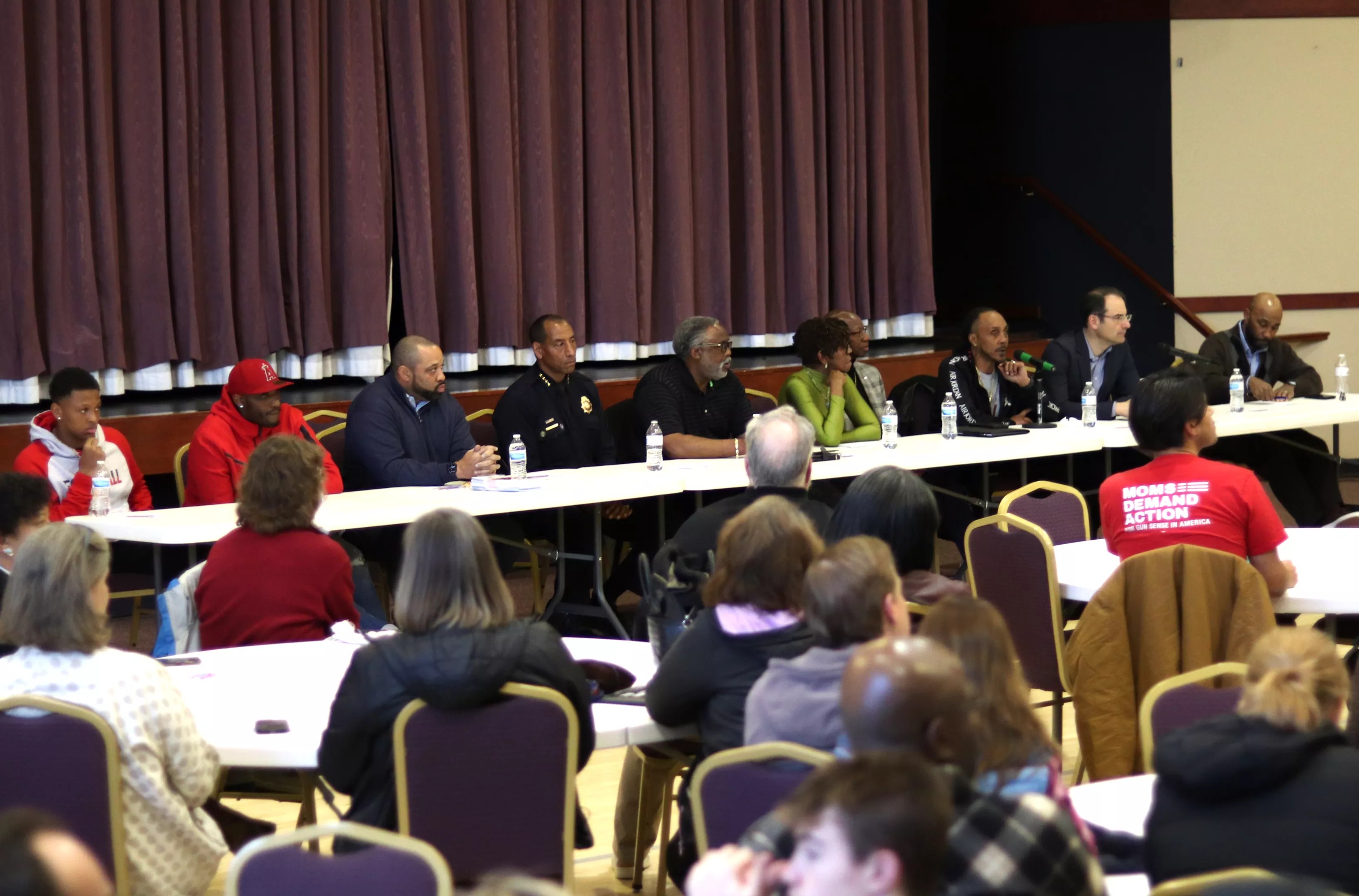
Benjamin Neufeld

Audio By Carbonatix
School resource officers and stricter gun legislation have been hot topics in Denver following the East High shooting and Luis Garcia tragedy. SROs will be back at city high schools on April 3, and gun measures have passed in both houses of the Colorado Legislature. Speaking at two public meetings this week, however, city leaders and community members admitted that those safety measures won’t be enough to stop youth violence and make students feel safe.
“When I think about all the bills that we are passing at the state level, I think they’re good work and I do believe in sensible gun violence prevention measures – three-day waiting period, extreme risk protection orders, background checks,” said state Representative and mayoral candidate Leslie Herod at the “Lunch & Listen” gathering on March 30 that she hosted with the Center for Community Innovation & Impact, the Kids Above Everything Center, and the RISE 5280 youth group.
“But our young people aren’t buying weapons at a gun store,” Herod continued. “They’re not waiting three days to go to the park and get their gun. They’re buying guns on campus, playgrounds, online, Snapchat, Instagram, and TikTok. And so none of these laws will apply.”
Beyond gun regulations and cops in schools, leaders and community members say students need more role models and mental health support. Those suggestions were also brought up at a discussion on youth violence hosted by John Bailey at New Hope Baptist Church on March 28.
“I don’t pretend to believe that putting officers back in schools is going to make schools safer,” said Denver Police Chief Ron Thomas at that event. Public outrage in Denver over the violence at East on March 22 resulted in last week’s swift – and uncoordinated – reinstatement of SROs, who had been removed by Denver Public Schools in June 2020.
At the March 28 forum, community leaders from around Denver talked about the need for positive and understanding support structures for at-risk youth, both in schools and out of schools. The panel included Attorney General Phil Weiser; East Dean of Students Kam Perkins; Dr. Anthony Young, president of the Denver-Rocky Mountain Association of Black Psychologists; and public policy analyst Dr. Marjorie Lewis.
During the forum, Thomas described hearing from kids with the advocacy group Students Demand Action. “They are actually upset about the fact that sometimes this conversation gets reduced to school resource officers,” he said.
SROs make students and parents feel safer,” Thomas acknowledged at the forum. More important, they can act as “another opportunity to have a trusted adult in a young person’s life that believes in law enforcement having a healthy relationship with youth in schools.”
He tells Westword, “I think we are one of those trusted adults, one of those people that can develop a relationship with young people.”
Auon’tai Anderson, the school board vice president who has been at the center of the controversy around both the removal and re-implementation of SROs, says he agrees with Thomas and others that solving the problem involves more than putting armed officers back on campuses.
“I’m grateful that the chief and I can agree that the presence of school resource officers does not mean the equivalent to having no school-based violence or crimes at all,” Anderson says. “I do believe that our young people need to be able to foster positive relationships with folks within our community that serve in a magnitude of roles, and policing is definitely one of them.”
According to Anderson, all cops should be trained to interact with students, not just SROs. “Right now, Denver only has eighteen people trained to interact with students,” he says. “I want every officer trained to be able to interact with kids; that that shouldn’t be a hard ask.”
“I think that officers are already well fashioned to step into a school and have positive engagements and interactions with youth,” responds Thomas. “And certainly there are social and emotional learning things that can be taught to officers in a school resource officer curriculum, which is offered on a regular basis, either through the Colorado Association of School Resource Officers or the National Organization of School Resource Officers.”
Anderson has held firm in his personal belief that SROs should be kept out of schools, despite the school board’s recent decision to bring them back. “I don’t believe we need to have [SROs] in schools in order to keep folks safe or to begin those positive relationships,” he says.
Anderson has repeatedly claimed that the mayor’s office forced the school board’s hand on the reinstatement of SROs by threatening to issue an executive order that would bring them back regardless of the board’s position. The mayor’s office has denied the claim, and Board President Xóchitl Gaytán has threatened to censure Anderson for the “disclosure of privileged information divulged to the board in the Executive Session that took place on Thursday 03/23/2023.”
When SROs return, they will be the same officers who were part of the program that was banned fro the schools amid protests over the death of George Floyd and police brutality. They’re slated to be officially back in DPS schools after spring break; the DPD has said it will cover the cost.